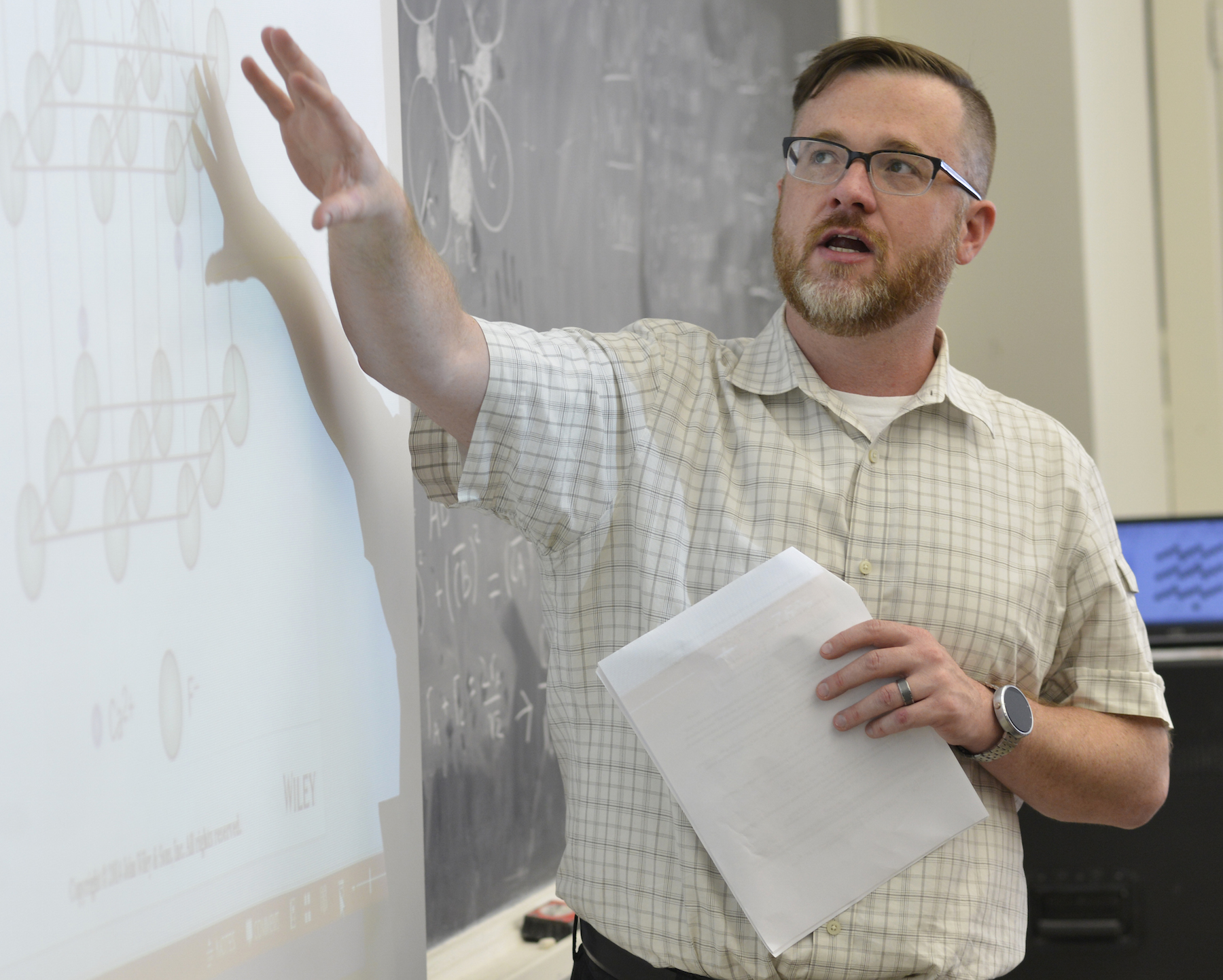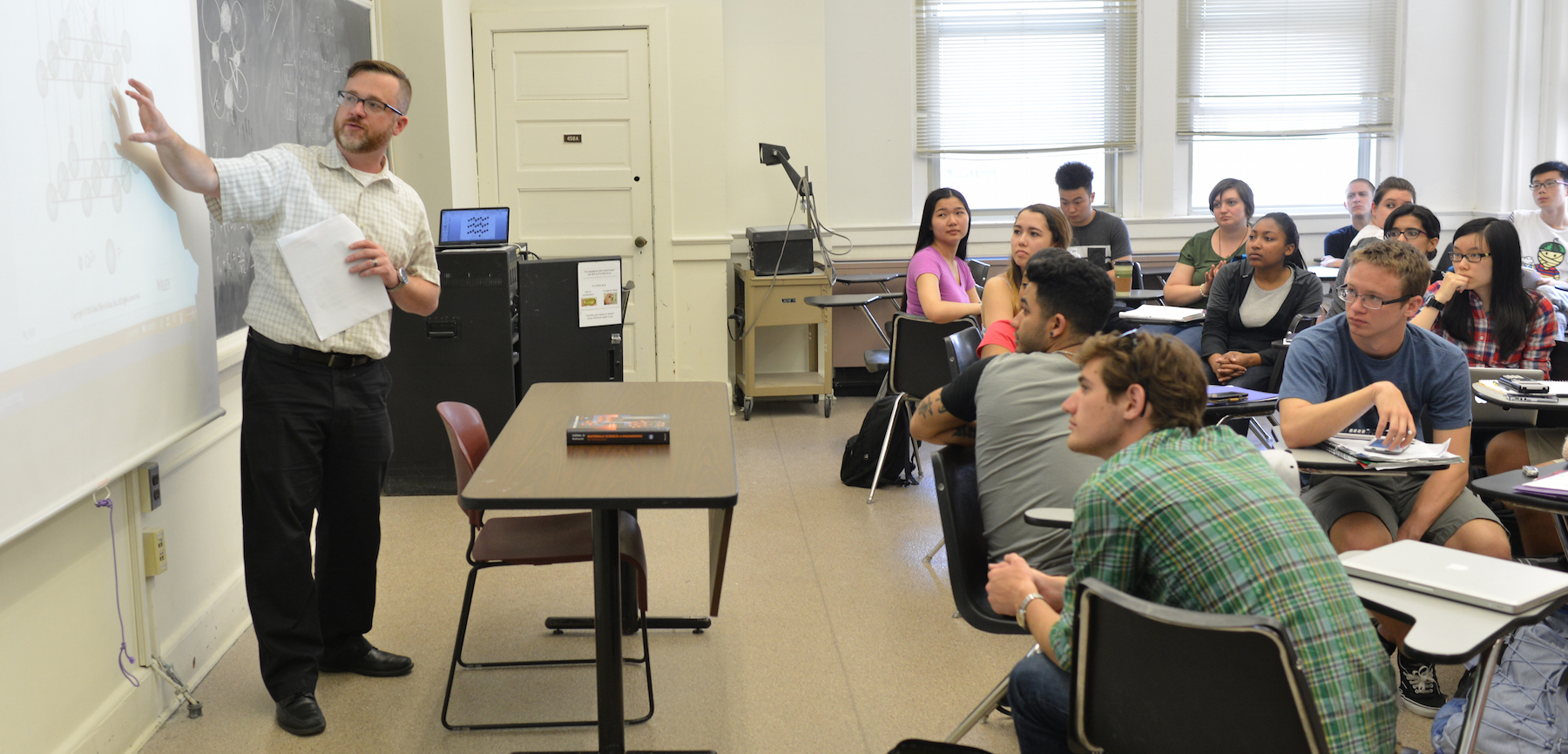A young attendee at Philly Materials Science and Engineering Day (Philly Materials Day) approaches a table of enthusiastic undergraduates making balloons into tetrahedra, pyramid-shaped structures. Dynamic graduate students run a workshop about nature-inspired robots, facilitating older kids to create their own. High school students at the Materials Science and Engineering Summer Institute present the results of their week-long research projects to a rapt audience. Undergraduate students view a lecture for their Fundamentals of Materials class in advance and show up in class ready to be challenged and engaged in problem solving and live demonstrations.

The person behind these interactions is Professor Christopher Weyant, teaching associate professor in the Department of Materials Science and Engineering (Drexel Materials). In just three years’ time, Weyant has transformed the educational landscape in Drexel Materials through an innovative approach to teaching and outreach, one he refers to as “active learning.”
“Active learning means getting students or participants to interact with the topic in a hands-on way,” says Weyant. “As opposed to passively sitting and being lectured to, students in a classroom or participants at an outreach event learn the material by physically doing something with it or participating in a discussion around what we are learning. By bringing the students more fully into the learning process, they become more a part of the process.”
Weyant believes in a holistic approach to engineering education that teaches students practical skills as well as life skills to succeed in the world. He especially embraces the idea that engineers are innovators and looks to foster their creative thinking.

As a teacher, Weyant put this philosophy into practice with his 400+-size ENGR 220 Fundamentals of Materials class by flipping the classroom. The “flipped classroom” involved students watching pre-recorded videos of Weyant’s lectures on their own time and coming to class prepared to engage with the material through in-class questions, problem solving, live demonstrations, and YouTube videos. While the flipped classroom concept is not unique to Weyant, he gave it his own spin, specifically to try to overcome the overwhelming class size and help students connect better with the material.
“I found that students were better able to adapt the material to their own learning styles by re-watching lectures as needed to reinforce what they were learning,” says Weyant. The in-class portion helped Weyant to tailor his teaching and activities to improve understanding on the topic.
To engage high school students in materials science and engineering, Weyant founded the Drexel Materials Science and Engineering Summer Institute, a week-long summer camp for rising junior and senior high school students and recent high school graduates interested in a hands-on summer experience to learn about how materials impact today’s technological advances. Weyant has grown the program from 16 students participating in a single week-long session to hosting over 60 students over a three-week period. In just a week’s time, students have the opportunity to complete two research projects and present their results, a rewarding experience for budding materials engineers.
“I wanted to make the Summer Institute a unique experience,” says Weyant, “where, in addition to engaging with materials science and engineering through experiential learning, the participants have ample opportunities to interact with a graduate student, undergraduate student, and professor (me) in order for them to understand what being a Drexel engineering student would really be like.”
Passionate about bringing materials science and engineering to a larger audience, Weyant has become the outreach point person for Drexel Materials. In particular, he revamped the hands-on demos offered at Philly Materials Day, the department’s day-long outreach event to introduce the general public to materials science and engineering. While the department partners with other organizations outside of Drexel to present the event, Drexel Materials is the host and lead organizer of the event. Weyant has helped to refine the event, last year introducing five key relatable themes—communications, earth, energy, health, and sports—under which the demos and workshops were presented. Additionally, he has involved his CIVC 101, Introduction to Civic Engagement, students in presenting some of the hands-on demos to the public, tasking them with crafting their own original demos. This gives the students the opportunity to hone their public speaking and teaching skills as well as their creative sides.
Weyant also created Drexel Experiences in Materials Outreach (DEMO) to connect Drexel Materials students to the general population and share the joys of materials science and engineering. Approximately 40 undergraduate and graduate students alike have engaged the public, especially K-12 students, through hands-on demonstrations and interactive workshops. Major outreach events that DEMO students participate in include Philly Materials Day and the Philadelphia Science Festival Carnival, among other outreach opportunities.
“My methodology continues to evolve through integration of proven pedagogy such as flipped classroom techniques and through my own experimentation improving student engagement,” says Weyant. “Fundamentally, the number one “product” of a professor is his or her students. Whether it be the undergraduates in a formal classroom setting or student teams working on a design project, developing engineers is critical for our national success. It gives me great satisfaction to be part of cultivating independent thinkers and problem solvers while inspiring leaders of the future.”